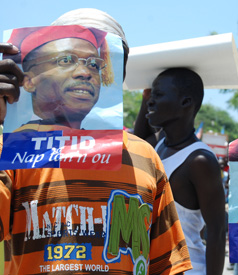Port-au-Prince, Haiti – Days after Haitians watched an exiled dictator come home, a former president issued a statement on Wednesday that fueled rumors that he, too, was angling to return.
The former president, Jean-Bertrand Aristide, a onetime priest of the slums who became Haiti’s first democratically elected president, said he was prepared to return home “today, tomorrow and at any time.” Mr. Aristide was ousted in 2004 in the midst of growing unrest and under intense pressure from the United States.
In a statement posted on the Internet, Mr. Aristide said he was eager to return “to contribute to serving my Haitian sisters and brothers as a simple citizen in the field of education.” Later, he added that because he had a serious eye condition, his doctors had recommended that he not spend another winter in South Africa, where he has lived in exile since leaving Haiti.
It was not the first time that Mr. Aristide had talked publicly of his desire to return to Haiti, but his statement — which read more like a plea — threatened to fuel tensions already stirred by the surprise return on Sunday of the former dictator Jean-Claude Duvalier.
Mr. Duvalier’s emergence from exile has not only threatened to complicate the country’s unresolved presidential election, but has also energized Mr. Aristide’s supporters. There has been a persistent flurry of speculation that Mr. Aristide, who rose to power as a champion of Haiti’s poor but became notorious for his violent crackdowns of political dissent, has been hopscotching across Central America and the Caribbean in anticipation of making his own surprise re-entry.
Mr. Aristide’s travels, however, have been limited because he does not have a valid Haitian passport. The nation’s president, René Préval, once a political protégé of Mr. Aristide’s, has refused to issue him a new one. More importantly, political analysts here said, his return would not be supported by either the United States or France, Haiti’s most important allies.
“Aristide could have 15 passports and he’s still not going to come back to Haiti,” said one analyst, who asked not to be identified because he was close to the Haitian government and was not authorized to speak to the media. “France and the United States are standing in the way.”
Mr. Aristide, who remains popular among the poor, appealed to the people in his statement.
“Despite the enormous challenges they face in the aftermath of the Jan. 12, 2010, earthquake,” he said, “their determination to make the return happen has increased.”
© 2010 The New York Times Company
Truthout has licensed this content. It may not be reproduced by any other source and is not covered by our Creative Commons license.
We have 9 days to raise $50,000 — we’re counting on your support!
For those who care about justice, liberation and even the very survival of our species, we must remember our power to take action.
We won’t pretend it’s the only thing you can or should do, but one small step is to pitch in to support Truthout — as one of the last remaining truly independent, nonprofit, reader-funded news platforms, your gift will help keep the facts flowing freely.
